This is an extract from the diary of Dr. George Dyer (BWH)
At St Marc a town 90 min from PAP in what's considered a large regional hosp. It is totally overwhelmed by patients.
Team includes several you would know-- Malcolm Smith from MGH, Selwyn Rogers from BWH.
Things badly organized and chaotic when we arrived. While trying to be culturally sensitive we have essentially taken over like an invading army. For example OR had no functioning anesthesia machine though three broken ones. There are two OR rooms and a PACU by design but disuse and necessity had left one OR completely useless and PACU turned into disorganized storeroom. Remaining OR had been used essentially only for c-sections under IV general it seems. Spent first day cleaning and repairing and reorganizing. Now have 2 working rooms each with an anesthesia machine. PACU functional and now has monitors. Our hosts have been unfailingly gracious and work unbelievably hard for us--most accomplishments refining OR have been their work really.
Clinical situation is overwhelming to think about. Census of acute surgical patients ~ 150, which took 2 days of superhuman work by internist, ED MD and non-OR RNs to catalog and begin to prioritize. Every one of those cases is as bad an injury as we usally see in a week-- nearly every fracture is open and/or has associated untreated compartment syndrome. Some open fractures were closed dirty or even casted open in other hospitals before we arrived. Catalog includes open pelvis fractures grossly unstable, spine fractures with 6 quads and paras, and many many missed compartment fractures and open injuries. This whole country is made of concrete buildings and most of Port au Prince fell down with people inside. Terrifying to think about.
Have done 27 cases so far. Our only operations have been I&Ds, amputations and 2 ex-laps to save life. Through resourcefulness and sheer force of will Malcolm was able to obtain Ex-fixes yesterday by raiding warehouses and an underutilized hospital in Port au Prince--I'll let him tell the story-- but we will sadly mostly need saws for now. We triage and determine OR list by acuity trying to save lives, then limbs. No room to manage deformity or any such niceties. Though it feels to us like Schindler's List, we also find that many patients refuse amputation because in this culture and with hardship a part of normal-pre earthquake life there is little way for an amputee to support him or herself. A priority in coming months will be to recruit prosthetists and solicit donation of simple durable prosthetic limbs.
We are falling behind though. Strange that there is no history to take on any patient. Most are young and were perfectly healthy until their house fell on them on 1/12/10. Sadly there was a small second wave of injuries mid week from aftershock. No building fell but terrified people jumped from balconies after experience the week before. For the most part though it means that all injuries are the same age so they are marching through the natural history from a uniform starting point, their clinical course distinguished only by their health status and the particulars of their injuries. We are of course trying to record everything so that others may benefit from this horrific experience.
Among our newer challenges is to control and harness the flood of volunteers who have descended on Haiti to help. We feel priviliged to be part of a well-established organization with decades of credibility and history here. Others are coming out of the woodwork. These are having a harder time finding useful roles and I fear they're actually a net burden because they consume resources while doing little high-quality work.
We feel proud and priviliged to be working here and despite the horrible odds we are facing as people grow sicker each day we are hopeful because Haiti is clearly a nation of winners. Just to get by here even before the earthquake people had to be pretty resourceful and resilient. Now it is evident just how tough they really are.
Thanks to all of you for all you're doing while we're gone.
George.
Wednesday, January 27, 2010
Subscribe to:
Post Comments (Atom)



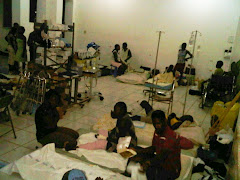
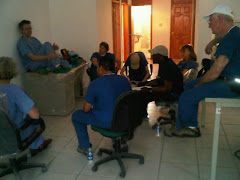
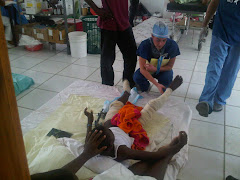
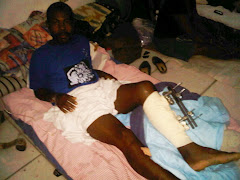
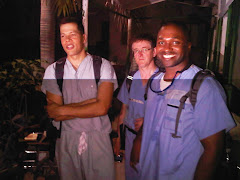
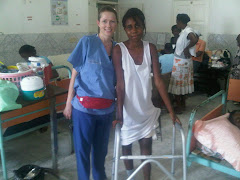
No comments:
Post a Comment